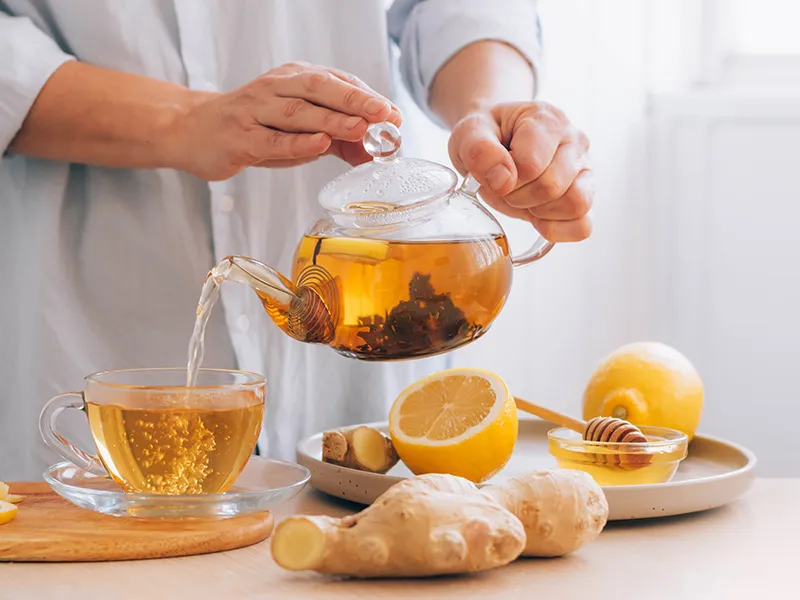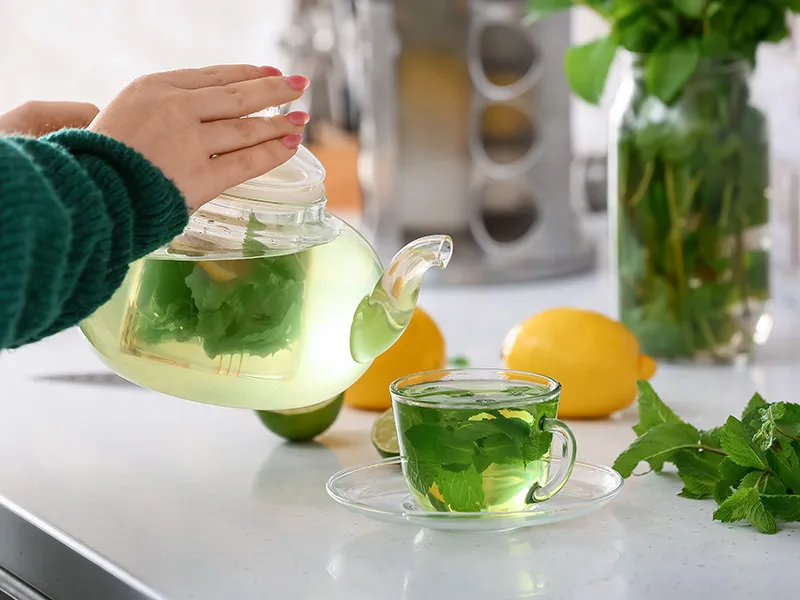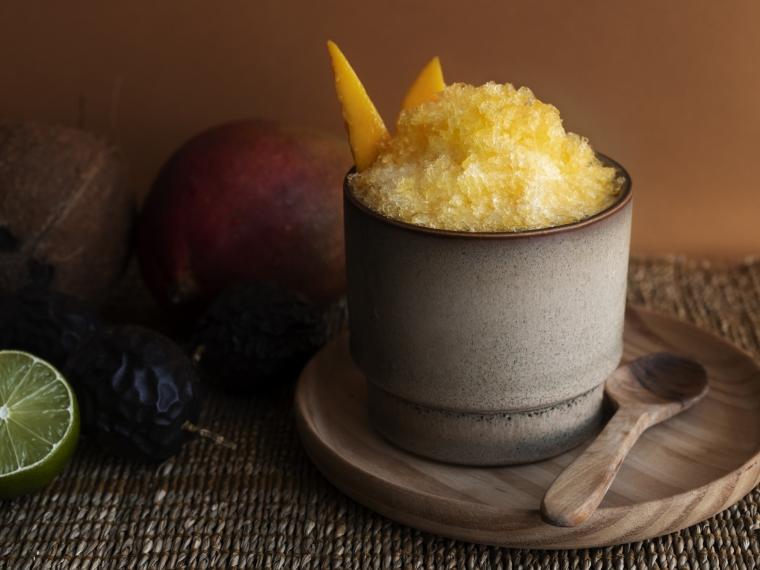Stomach ache and cramps are common problems that can occur for various reasons, including indigestion, stress, and bloating. Fortunately, nature offers many solutions for these issues. Herbal teas have long been used as an effective and natural method to relieve abdominal pain. Here are 13 herbal teas that can help alleviate stomach ache and cramps.
- Ginger Tea
Ginger is one of the oldest medicinal plants known for its anti-inflammatory and anti-nausea properties. It helps stimulate digestion and reduce stomach contractions, making it very effective for stomach aches and cramps caused by indigestion and nausea.
Benefits of Ginger Tea

Ginger tea not only helps relieve stomach ache and cramps but also reduces inflammation in the intestines and stomach. Ginger is also known to improve blood circulation and strengthen the immune system.
How to Prepare Ginger Tea
Peel and chop a piece of fresh ginger (about 1-2 cm). Put it in a cup of boiling water and let it brew for about 10 minutes. Strain the tea and add some honey or lemon for better taste.
- Mint Tea
Mint is known for its soothing properties for the stomach and digestive system. The compounds in mint can relax the muscles of the stomach and intestines, helping to reduce bloating and gas.
Benefits of Mint Tea

This tea helps relieve stomach ache and intestinal spasms. Additionally, mint stimulates bile secretion, improving digestion and providing overall relaxation to the digestive system.
How to Prepare Mint Tea
Add some fresh mint leaves (about 10 leaves) to a cup of boiling water. Let the tea brew for 5 to 7 minutes. Strain the tea and drink it warm.
- Chamomile Tea
Chamomile is one of the best options for relieving stomach ache and cramps due to its anti-inflammatory and antispasmodic properties. It helps reduce digestive stress and relax abdominal muscles.
Benefits of Chamomile Tea
Chamomile tea helps relax stomach muscles and reduce digestive inflammation. It is also very useful for reducing stress and anxiety, which can lead to stomach ache.
How to Prepare Chamomile Tea
Add a teaspoon of dried chamomile flowers to a cup of boiling water and let it brew for about 10 minutes. Strain the tea and sweeten it with honey if desired.
- Fennel Tea
Fennel is beneficial for relieving digestive problems, including stomach ache and cramps. It helps reduce bloating and stimulate bowel movements.
Benefits of Fennel Tea
Fennel helps regulate bowel movements and reduce stomach bloating. Its antispasmodic properties also help relieve abdominal pain and facilitate digestion.
How to Prepare Fennel Tea
Add a teaspoon of fennel seeds to a cup of boiling water. Let the tea brew for about 10 minutes. Strain it and enjoy with honey if desired.
- Cumin Tea
Cumin is known for its anti-bloating and antispasmodic properties. It is very effective for reducing stomach ache and cramps and helps improve digestion.
Benefits of Cumin Tea
Cumin tea helps regulate bowel movements, reduce stomach gas, and relieve pain caused by bloating. It is also beneficial for those with digestive issues.
How to Prepare Cumin Tea
Add a teaspoon of cumin seeds to a cup of boiling water. Let the tea brew for 10 minutes. Strain it and drink.
- Cinnamon Tea
Cinnamon is known as a warming herb that helps improve blood circulation and reduce bloating. This tea is useful for relieving stomach ache and cramps caused by cold stomach.
Benefits of Cinnamon Tea
Cinnamon tea helps reduce intestinal inflammation and improve digestion. It also has antibacterial properties that can help address stomach problems caused by infections.
How to Prepare Cinnamon Tea
Add a cinnamon stick or a teaspoon of cinnamon powder to a cup of boiling water. Let the tea brew for 10 minutes. Strain it and drink.
- Lemon Balm Tea
Lemon balm is a herb with soothing and antispasmodic properties, making it suitable for reducing muscle tension and relieving stomach ache and cramps.
Benefits of Lemon Balm Tea
This tea helps relieve stress and anxiety, which can lead to stomach ache. Lemon balm also helps regulate bowel movements and reduce stomach bloating.
How to Prepare Lemon Balm Tea
Add a teaspoon of dried lemon balm leaves to a cup of boiling water. Let it brew for 10 minutes, then strain and drink.
- Barberry Tea
Barberry, with its sour taste and antioxidant properties, is one of the best options for improving digestive function. This tea helps reduce stomach inflammation and relieve stomach ache.
Benefits of Barberry Tea
Barberry tea helps improve liver function and digestion. Its anti-inflammatory properties also help reduce digestive inflammation and relieve pain.
How to Prepare Barberry Tea
Add a tablespoon of dried barberry to a cup of boiling water. Let the tea brew for 10 minutes. Strain it and drink.
- Lavender Tea
Lavender is beneficial for relieving stress and cramps due to its soothing properties. It helps relax abdominal muscles and improve digestion.
Benefits of Lavender Tea
This tea helps reduce nervous tension and relieve stomach pain caused by stress. Lavender is also known to improve sleep and reduce anxiety.
How to Prepare Lavender Tea
Add a teaspoon of dried lavender flowers to a cup of boiling water. Let it brew for 5 to 7 minutes. Strain the tea and drink.
- Thyme Tea
Thyme is an aromatic herb beneficial for the digestive system. It has antibacterial and anti-inflammatory properties and helps relieve stomach ache and cramps caused by digestive infections. Thyme also helps improve digestion and prevent bloating and gas.
Benefits of Thyme Tea
Thyme tea helps reduce stomach inflammation and infections due to its antibacterial and antiseptic properties. It is also very effective for relieving stomach gas and improving digestion.
How to Prepare Thyme Tea
Add a teaspoon of dried thyme to a cup of boiling water. Let the tea brew for 10 minutes. Strain it and drink. You can add some honey for better taste.
- Cardamom Tea
Cardamom is another herb known for its soothing and anti-bloating properties, making it very effective for stomach ache and cramps. Cardamom tea helps relieve digestive inflammation and relax the stomach and intestines.
Benefits of Cardamom Tea
Cardamom tea helps improve digestion and prevent gas buildup in the stomach. It also has antispasmodic properties that help reduce cramps and digestive pain.
How to Prepare Cardamom Tea
Crush two green cardamom pods and add them to a cup of boiling water. Let the tea brew for 10 minutes. Strain it and drink. You can also use honey or cinnamon for better taste.
- Marshmallow Root Tea
Marshmallow root is beneficial for relieving digestive problems like stomach ache and cramps due to its anti-inflammatory and soothing properties. It helps reduce stomach and intestinal inflammation and relax abdominal muscles.
Benefits of Marshmallow Root Tea
Marshmallow root tea helps improve bowel function and prevent digestive inflammation. It is also very effective for relieving muscle cramps in the abdominal area.
How to Prepare Marshmallow Root Tea
Add a tablespoon of dried marshmallow root to a cup of boiling water. Let the tea brew for 10 to 15 minutes. Strain it and drink. This tea should be consumed warm and in short intervals.
- Rose Tea
Rose is one of the best options for relieving stomach ache and cramps due to its pleasant aroma and anti-inflammatory properties. It helps reduce stress and stomach inflammation and improves digestion.
Benefits of Rose Tea
Rose tea helps relax the digestive system and prevent bloating and stomach contractions. It also has soothing properties that help improve mood.
How to Prepare Rose Tea
Add a teaspoon of dried rose petals to a cup of boiling water. Let the tea brew for 7 to 10 minutes. Strain it and drink with honey.
Summary
Herbal teas have long been used as a natural and effective solution for relieving stomach ache and cramps. Each of these herbs has unique properties that help improve digestive function and reduce stomach and intestinal inflammation. By adding these teas to your diet, you can benefit from their remarkable properties for overall body health and improved digestion.
Frequently Asked Questions
- Can these teas be consumed daily?
Yes, most of these teas are safe for daily consumption, but it is best to consult a doctor before long-term use.
- Can the teas be combined?
Yes, some teas like ginger and mint combine well and complement each other's properties.
- How long should herbal teas steep?
Depending on the herb, teas usually brew for 5 to 15 minutes.
- Do herbal teas have side effects?
In most cases, herbal teas are harmless. However, some people may be sensitive to certain herbs or should consult a doctor if they are taking medication.
- Are herbal teas safe for children or pregnant women?
Some teas like chamomile are safe for children and pregnant women, but it is always best to consult a doctor before consuming any tea in pregnancy or for children.
- How can I choose the best tea for my stomach ache?
The choice of tea depends on the type of stomach ache and its cause. If your stomach ache is due to indigestion, ginger or mint tea can be helpful. If it is due to stress or nervous tension, lavender or lemon balm tea would be suitable.
- Can teas be prepared in larger quantities and stored?
Yes, you can prepare teas in larger quantities and store them in the refrigerator. However, it is best to consume teas fresh to maximize its benefits.





